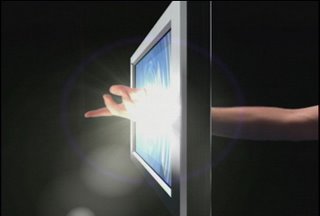X + Y = Δ
 How are Generations X & Y changing the consumer landscape? To start with, they are living in new ways via the Internet. They shop, network, research, download, learn, blog, entertain and express themselves online. As a result, large traditional retail outlets are losing market share to the nimble and niche players in the online universe. And amazingly, this is just the beginning of the Information Revolution.
How are Generations X & Y changing the consumer landscape? To start with, they are living in new ways via the Internet. They shop, network, research, download, learn, blog, entertain and express themselves online. As a result, large traditional retail outlets are losing market share to the nimble and niche players in the online universe. And amazingly, this is just the beginning of the Information Revolution.As the Internet has become a new portal for X'ers and today's teens to extend and integrate their lives, companies are scurrying to find creative ways to reach them as traditional means of marketing and advertising are losing their effectiveness. Rupert Murdoch (chairman of News Corp.), Hollywood, MTV (via MTV Flux), and a myriad of marketing firms are courting (or buying in Murdoch's case) online social networking sites like MySpace, YouTube, and FaceBook. In fact, both CNN and the Financial Times ran pieces on the courtship today.
Wired's Chris Anderson has written about this shift in his new book, "The Long Tail: Why the Future of Business is Selling Less of More." While I have yet to read the book, comments from him in various interviews recently as well as on his blog indicate Anderson may be a leading thinker on the edge of this phenomenon. Certainly his time spent in China with The Economist and his current gig with Wired afford him a unique perch to view the evolution. His interview on Charlie Rose last night was particularly insightful (see it here). In some ways, he appears to be Generation X & Y's own Thomas Friedman--hip, culturally relevant, technologically savvy, well informed on the issues affecting these groups, and on the cutting edge of envisioning the future. His main thesis: the future world will not be made up of a few large, centralized distributors. Rather, it will contain numerous decentralized, niche groups who are defined by the segmented audiences who support them. If you follow Friedman's democratization theses, Anderson's argument seems plausible. The Internet's low cost of entry has shifted power from megapowers with the most money in their coffers to quite literally anyone who desires to have a presence. No longer does one need the capital, infrastructure, and distribution channels big media once controlled. If you want to publish or act like a journalist, use Blogger. Want to produce movies and TV shows? Use YouTube. Want distribution for your music? MySpace. All these services are a one-stop shop for your respective needs. Best of all, they are FREE to use and therefore, fully accessible to anyone with an Internet connection! To quote Friedman, "The world is (now) flat."
If nothing else, it's some food for thought as the future unfolds. Sit back and enjoy the show. It's becoming more fascinating with each advancement.


0 Comments:
Post a Comment
<< Home